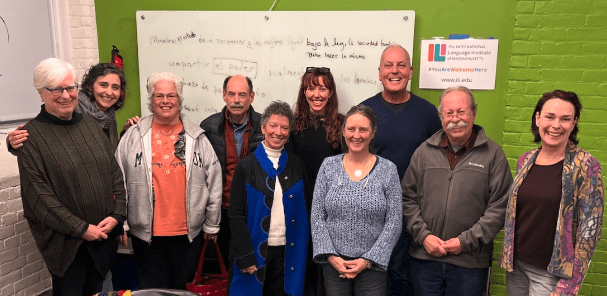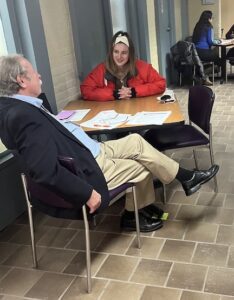By Steven Budd, ILI Volunteer and Spanish student
After retiring some five years ago from college administration, I became a guy with some time on his hands. A friend passed along a flyer, and I saw what I thought might be an opportunity. I had always wanted to speak Spanish, and after a lifetime of stops and starts, maybe – just maybe – this was the right time and ILI was the right place to make it happen. Undaunted by more than a 50-year habit as a serial Spanish student, I decided to check out ILI’s World Language Program.
Like many of us in western Mass, I knew ILI as the local language school. It received good reviews as a place for adults to get serious about languages, and to do it without the pressure of grades and academic competition – serious, but fun!

Since that first class, I have continued to enroll each semester, looking forward to advancing my skills along with the many new friends I have met. Perhaps most important is an appreciation of ILI’s mission and the extent of what it seeks to accomplish. As the traditional World Language Program continues to grow, I’m not sure it is common knowledge that the language in highest demand is now English, and that the demand comes from those who need it the most – those seeking a better life for themselves and their families through education, economic opportunity and the chance to thrive in a place where it is likely to happen, the State of Massachusetts and the United States of America. We’re talking about immigrants and refugees.
I became interested in volunteering after learning about ILI’s free English classes for these folks, a program supported by Public Education of Massachusetts as well as ILI’s tuition-based programs, like World Languages, an expanding network of donors and a seriously aggressive grant development program. With my own background in college fundraising, my volunteer focus is now prospecting for grants and working with staff, faculty and board members in making ILI successful sustainable.
So here’s why I support ILI.
Employers and educators from across the U.S agree — English language skills are a necessity for holding a decent job with good prospects for economic advancement. For decades, the demand for English language instruction has far outpaced the ability of organizations around the country, like ILI, to meet that demand. The result is long waiting lists. In fact, many organizations have stopped “waitlisting” students. When waitlists exceed a few years, it just seems absurd to maintain them. At ILI, we continue to maintain a waitlist and funnel students into classes as quickly as we can, but the inevitability of losing waitlisted students increases over time.

For more than 36 years, ILI’s free English classes have welcomed adult immigrants and refugees. In 2023, 204 immigrants and refugees from 41 countries speaking 30 languages enrolled in the free classes. The tally in 2024 is well on its way to exceed 2023. More than 90 employees from regional businesses also participated in workplace-based English language classes to grow their English skills, with promotions in mind. The cost of classes offered on the job are largely covered by employers.
ILI’s curriculum also grows and changes to meet the needs of today’s students, from basic English instruction to an advanced Bridge to Careers and College course supported by United Way of the Franklin and Hampshire Region and generous donors. All of this work is geared to help students All of this work is aimed at helping students enhance their English skills and understand the systems crucial to everyday life in the U.S. I have participated in offering “mock job interviews” for students who want to test their readiness for the job market, and I have been both touched and humbled at the degree of effort they show. I am also proud of our forward-thinking employers who give these students their first shot.An even greater challenge are the English language students who come with job skills, some with professional and specialized backgrounds. Professional licensing is a long haul for most (we’re talking physicians, nurses, engineers, architects, educators, journalists). They value paid work as a sign of self-worth and as a sign of progress in achieving the dream of becoming U.S. citizens.
The big picture of ILI’s reach in Western New England is much more than that of a local language school. ILI offers teacher preparation and certifications in teaching English for speakers of other languages (ESOL) in partnership with the School for International Training (SIT) in Vermont. The University Pathways Program provides conditional admission for international students in the intensive English courses at ILI’s 12 university and college partners, and we work with immigrant and refugee students as they seek to transition to community colleges. And ILI maintains a broad network among language schools around the world and offers information and support for language learning travel for everyone.
ILI is a hugely valuable resource, and there are many ways to support it. Our volunteers work with students to improve their English and learn to navigate systems essential to life in the U.S.
I urge you to take a good look at us and consider the opportunity to give.
Happy 40th, ILI! Our work has just begun.